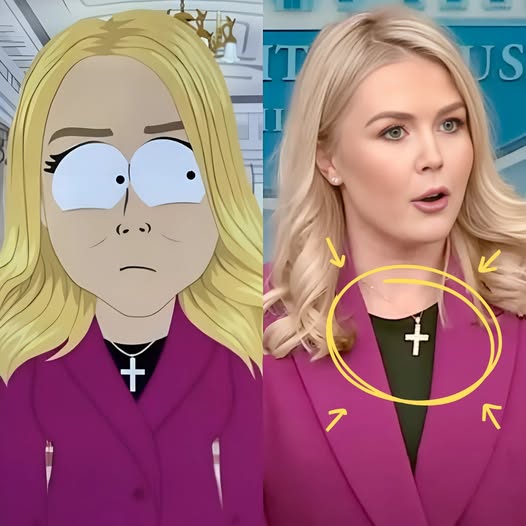The creators of South Park, Trey Parker and Matt Stone, have long been celebrated for their razor-sharp satire, and their latest target was White House Press Secretary Karoline Leavitt’s signature cross necklace. In a recent episode, the animated series transformed this emblem of faith into a comedic prop, unraveling Leavitt’s carefully curated image as a pious and principled figure in a matter of minutes. The fallout? The necklace, once a staple of Leavitt’s public appearances, has reportedly vanished from view, showcasing the unparalleled power of modern satire to reshape public perception.

A Symbol of Faith or a Political Prop?
Leavitt, known for her polished presence and vocal advocacy within the Trump administration, has frequently worn a simple cross necklace during high-profile events, including press briefings and public outings like the U.S. Open men’s final on September 7, 2025. The necklace, subtle yet prominent, was widely interpreted as a nod to her conservative values and Christian faith—a visual cue that resonated with many of her supporters. But for South Park, this accessory was ripe for satire.
In the episode, titled “Cross Purposes,” the show’s creators exaggerated the necklace into a comically oversized caricature, depicting it as a glowing, almost magical talisman that Leavitt wielded to deflect criticism and project moral superiority. The episode’s biting humor didn’t just mock the accessory—it framed it as a calculated prop in a broader political performance, poking fun at how public figures use symbols to craft their image.
The Satirical Takedown
South Park’s genius lies in its ability to expose contradictions through absurdity. The episode portrayed Leavitt’s character clutching the cross during a chaotic press conference, using it to “ward off” tough questions from cartoonish reporters. Lines like, “Back, you heathens! The power of the cross compels you!” had audiences in stitches while highlighting the perceived performative nature of Leavitt’s public persona. By amplifying the necklace’s significance to absurd levels, Parker and Stone stripped it of its intended gravitas, turning a symbol of sincerity into a punchline.
The episode also wove in broader commentary on political image-making, with references to Leavitt’s role in navigating the Epstein-related controversies that have dogged the Trump administration. Without directly naming the scandal, the show cleverly alluded to the tension, with one character quipping, “That cross can’t cover everything, Karoline.” The result was a layered critique that questioned the authenticity of public displays of virtue.
The Necklace’s Disappearance
Following the episode’s airing, reports surfaced that Leavitt has stopped wearing the cross necklace in public, a move that sparked speculation across social media and news outlets. While the White House has not commented on the change, pundits suggest the satire hit a nerve, prompting Leavitt to distance herself from an accessory now tainted by ridicule. Posts on X noted the absence of the necklace during recent press briefings, with some users joking, “Did South Park yeet the cross into another dimension?”
This isn’t the first time South Park has influenced real-world behavior. The show’s ability to hold a mirror to society has previously led public figures to alter their habits, from fashion choices to public statements. Leavitt’s case, however, is a striking example of how a single satirical jab can dismantle a meticulously crafted image.
The Power of Satire in the Modern Age
The South Park episode underscores the unique role of satire in today’s media landscape. In an era where public figures rely on carefully curated symbols to convey their values, shows like South Park can expose the artifice behind these choices. By turning Leavitt’s cross into a comedic prop, the creators didn’t just mock her—they sparked a broader conversation about authenticity, faith, and the performance of politics.
For Leavitt, the episode may serve as a cautionary tale about the fragility of public image in the face of sharp-witted satire. Whether the necklace returns to her wardrobe remains to be seen, but one thing is clear: Parker and Stone have once again proven their ability to leave a lasting mark on the cultural and political landscape, one laugh at a time.







